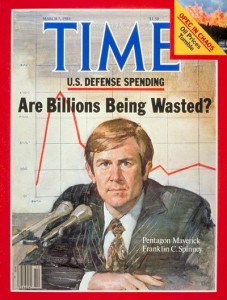
Herewith is a stunning series of reports by Gareth Porter, one of the very best investigative journalists in America. Not only does he show how King David created the myth of his success and became naked in the process, he puts the failures of the surges in Iraq and Afghanistan into a definitive perspective. But perhaps most importantly, at least to my thinking, Gareth also expose the emptiness of real lesson learned by the US military from its failure in Vietnam … namely how protect the institution from criticism by manipulating and controlling the narrative of failing wars and a breakdown of leadership by capturing the thinking and imagination of the press. This manipulation was evident in the uncritical coverage of the First Gulf War, but the superficial appearance of success in those wars masked the rot embedded (pun intended) in the “lesson learned.” Thanks to Gareth, it is now clear to anyone who makes an effort to study this report.
Chuck Spinney
All 4 Parts: How Petraeus Created the Myth of His Success
Truthout, Tuesday, 27 November 2012 17:43
Part 1: How the Myth Began – Petraeus in Mosul
Part 2: How Petraeus Quietly Stoked the Fires of Sectarian War Without Getting Burned
Part 3: Petraeus Rising: Managing the “War of Perceptions” in Iraq
Part 4 True Believer: Petraeus and the Mythology of Afghanistan
Final paragraph:
The Petraeus Legacy: Conscious and Unconscious Falsehoods
David Petraeus always demonstrated political agility in his management of the “war of perceptions” in Iraq and Iran, gravitating to story lines that would create an image of success even though the larger picture still looked uncertain, if not unfavorable.
But in Afghanistan, the Petraeus strategy did have the same effect as it had in Iraq. He was never able to show that the Taliban insurgency had been brought under control. As Lt. Col. Danny Davis, who returned from his second tour in Afghanistan in late 2011 after having traveled more than 9,000 miles around the country, reported in an 84-page assessment, the level of Taliban attacks in 2011 was still at or above the 2009 levels that had prompted US officials to fear that the war was being lost.
Davis charged that Petraeus' March 2011 report to Congress was “misleading, significantly skewed or completely inaccurate.” Davis presented a classified version of his report to a bipartisan group of Senators and House members that cited dozens of classified documents in support of his charge. And in a telling reflection of Petraeus' failure of to make a credible case, The New York Times covered Davis' critique in a front page story in January 2012. The only question about his attack on Petraeus' claims was whether Petraeus was knowingly lying or saying what he chose to believe.
Phi Beta Iota: Petraeus is a good man, flawed as all men are. We disagree with the view that his career/utility is ended. The most important part of this story is not that Petraeus excelled at deceiving the White House, Congress, the press, and the public; but rather that intelligence and integrity has been lost across the board. Since the 1970's selected individuals have been speaking truth to power about everything from limits to growth and true cost economics to peak everything and the dangers of complicit government. The truth has been the casualty of wanton war, and the public, normally the primary source of national power, has instead becomes a toxic waste dump within which good people struggle to be honorable.
See Also:
Fedor Dostoevsky: A man who lies to himself, and believes his own lies, becomes unable to recognize truth, either in himself or in anyone else.
Carl Jung: The maintenance of secrets acts like a psychic poison which alienates the possessor from the community.
Bob Seelert, Chairman of Saatchi & Saatchi Worldwide (New York): When things are not going well, until you get the truth out on the table, no matter how ugly, you are not in a position to deal with it.
Ben Gilad: Top managers’ information is invariably either biased, subjecive, filtered or late. . . . Using intelligence correctly requires a fundamental change in the way top executives make decisions.
Daniel Ellsberg speaking to Henry Kissinger: The danger is, you’ll become like a moron. You’ll become incapable of learning from most people in the world, no matter how much experience they have in their particular areas that may be much greater than yours” [because of your blind faith in the value of your narrow and often incorrect secret information].
Thomas Jefferson: A Nation’s best defense is an educated citizenry.
Thomas Jefferson: Educate and inform the whole mass of the people… They are the only sure reliance for the preservation of our liberty.
Thomas Jefferson: I know no safe depository of the ultimate powers of the society but the people themselves; and if we think them not enlightened enough to exercise their control with a wholesome discretion, the remedy is not to take it from them but to inform their discretion by education. This is the true corrective of abuses of Constitutional power.
James Madison: Knowledge will forever govern ignorance; and a people who mean to be their own governors must arm themselves with the power which knowledge gives.
Alvin Toffler: Information is a substitute for time, space, capital, and labor
Albert Camus: A taste for truth at any cost is a passion which spares nothing.
Robert Steele: The truth at any cost reduces all other costs.



